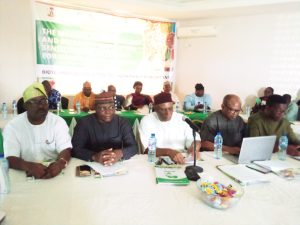
Prof. Abdullahi Mustapha, Director-General of National Biotechnology Development Agency(NABDA) has said that successful operations of biosafety laws in Nigeria will bring significant benefits to farmers and aid rapid economic transformations.
Mustapha said this at the Modern Biotechnology and Biosafety Regulation Sensitisation Workshop organised for NABDA’s Board Members by Open Forum on Agricultural Biotechnology(OFAB), Nigeria Chapter in Abuja.
“Successful operations of biosafety laws in the country ensures that Nigeria’s well over 70 million farmers will keep reaping continuously, the significant benefits of agricultural biotechnology.
“This is similar to economic transformations currently experienced in Argentina, Brazil, India, Sudan, Togo, Ethiopia and South Africa that have all adopted this modern approach to boost their food and cash crop production,’’ he said.
The director-general maintained that by having a National Biosafety Management Agency in place to ensure safe and responsible practice of the technology, the country would have commenced a silent revolution towards attaining laudable goals.
Mustapha listed these goals to include: transforming agriculture from subsistence to commercial and business levels.
He said farmers all over the world were witnessing improved yield, which also means improved access to food not only for their families but as well as producing excess for export.
“It should be noted that the adoption of higher yielding biotech crops by farmers across the world, continue to deliver substantial agronomic, environmental, economic, health and social benefits to farmers and society at large,” he said.
He said another goal was addressing food security challenges of growing population by not only making food available in sufficient quantity, but in quality, to meet dietary needs for active and healthy lifestyle.
Mustapha also mentioned empowering agricultural research institutes to continue with their work on biotech crops and ultimately commercialise the positive outcome of their research findings for farmers’ benefit.
He further said another goal was consolidating the diversification of economy from oil revenue to a more sustainable revenue generation from massive food/cash crop activities supported by modern agricultural biotechnology.
“The importance of this to a country like Nigeria known as a non-importer of major food items, moving from that to becoming an exporter nation of agricultural produce cannot be overemphasised,” he said.
The NABDA boss said the workshop was to empower and provide an update on the recent developments in the agricultural and biosafety regulation sectors and across the country at large.
“Our expectation is that as stakeholders in this sector, you will join us in the campaign for the enhancement of food security, climate change mitigation, nutritional enhancement, flattening the curve of COVID-19.
“Nigeria being the giant of Africa, if Nigeria gets it right, the whole of Africa will get it right,’’ Mustapha said.
The News Agency of Nigeria (NAN) reports that highlight of the event was presentation of lectures eminent scientists and biotechnologists.
Prof. Paul Oyenekwe, Director- General of Sheda Science and Technology Complex spoke on: ”Biotechnology in National Development: The role of research and Development Agency in Knowledge Economy.”
Prof. Chiedozie Egesi, Director, Next Generation Cassava Breeding Project-IITA, spoke on: ”Plant Genetic Modification: The case study of Bio fortified Cassava Plus and Highlights on Genome Editing.”
Prof. Rufus Ebegba, Director-General, National Biosafety Management Agency, spoke on: ”The Imperatives of Biosafety Regulation in Nigeria.”
In her presentation on ”Agricultural Biotechnology Advocacy in Nigeria: OFAB Nigeria Experience,” Dr Rose Gidado, Country Coordinator of OFAB, gave a breakdown of agricultural biotechnology and why it matters.
She said there was urgent need to hasten up because of the total number of undernourished people in the world, with more than 282 million people from Africa.
“More alarming is the fact that the figure keeps increasing, 118 million people were facing hunger in 2020 than in 2019.
“Recently, the war between Ukraine and Russia has further thrown several millions across the globe into severe hunger and malnutrition, more specifically, regions across Africa that depends on the conflicting countries for food supply,’’ Gidado said.(NAN)



